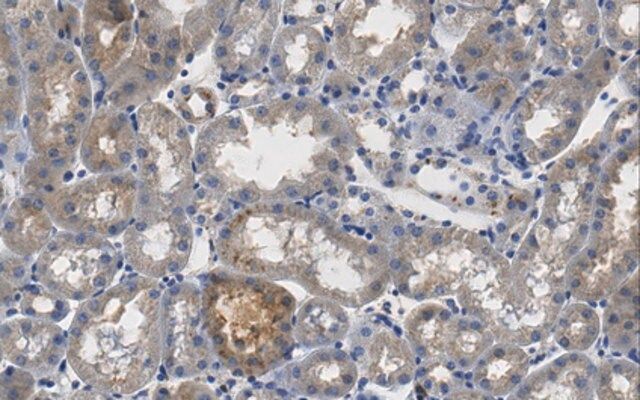您的位置:首页 > 产品中心 > Anti-AGE Antibody, Carboxy-Methyl Lysine Antibody, clone 6C7
Anti-AGE Antibody, Carboxy-Methyl Lysine Antibody, clone 6C7

产品别名
Anti-AGE Antibody, Carboxy-Methyl Lysine Antibody, clone 6C7
N(epsilon)-(carboxymethyl) lysine, CML, AGE-CML, N-epsilon-CML, AGE-CML (6C7) Antibody
基本信息
| eCl@ss | 32160702 |
| General description【一般描述】 | Chronic accumulation of Advanced Glycation End products (AGEs) is a common feature during aging, hyperlipidemia, and diabetes and affects function of proteins, lipids, and DNA. Although formation of AGE products is considered to be predominantly an endogenous process, certain external factors, such as some dietary products and smoking can increase the level of AGE in tissues. Under certain conditions glucose may form covalent adducts with the plasma proteins through the process of glycation. Glycation is a non-enzymatic reaction of reducing carbohydrates with lysine side chains and N-terminal amino groups of proteins. The term AGE often refers to non-reactive terminal products, such as N- carboxymethyllysine (CML) as well as reactive precursors, such as methylglyoxal (MG). CML is an AGE product that is usually found on proteins and lipids as a result of oxidative stress and chemical glycation. Excessive glycation can disrupt protein function by altering enzyme activity, receptor function, and molecular conformation. Protein glycation and subsequent formation of AGE products contributes to the pathogenesis of diabetes-related complications, such as retinopathy, nephropathy, and neuropathy. Higher levels of CML have been linked to greater hip fracture risk in older adults, independent of bone mineral density. AGE products interact with a variety of cell-surface AGE-binding receptors (RAGE) that results in their endocytosis and degradation. It can also generate pro-oxidant and pro-inflammatory events in cells. AGE products could also contribute to the development or worsening of many degenerative diseases, including Alzheimer′s disease. (Ref.: Cai, W., et al. (2002). Mol. Med 8 (7): 337-346; Barzilay, JI et al (2014). J. Bone Miner. Res. 29(5):1061-1066). |
| Specificity【特异性】 | Clone 6C7 specifically reacts with carboxymethyl lysine modified proteins. |
| Immunogen【免疫原】 | Carboxymethyl Lysine modified Keyhole Limpet Hemocyanin (KLH). |
| Application【应用】 | Research Category Neuroscience Anti-AGE, Carboxy-Methyl Lysine, clone 6C7, Cat. No. MABN1837, is a highly specific mouse monoclonal antibody, that targets Carboxy-Methyl Lysine (CML) modified proteins and has been tested in Immunohistochemistry (Paraffin). |
| Quality【质量】 | Evaluated by Immunohistochemistry in mouse kidney tissue. Immunohistochemistry Analysis: A 1:50 dilution of this antibody detected AGE, Carboxy-Methyl Lysine in kidney tissue of mice fed high AGE diets. |
| Physical form【外形】 | Protein G purified Purified mouse monoclonal antibody IgG2a in buffer containing 0.1 M Tris-Glycine (pH 7.4), 150 mM NaCl with 0.05% sodium azide. Format: Purified |
| Other Notes【其他说明】 | Concentration: Please refer to lot specific datasheet. |
产品性质
| Quality Level【质量水平】 | 100 |
| biological source【生物来源】 | mouse |
| antibody form【抗体形式】 | purified immunoglobulin |
| antibody product type | primary antibodies |
| clone【克隆】 | 6C7, monoclonal |
| species reactivity | mouse |
| species reactivity (predicted by homology) | human, rat |
| technique(s) | immunohistochemistry: suitable (paraffin) |
| isotype【同位素/亚型】 | IgG2aκ |
| shipped in【运输】 | ambient |
产品说明
| Storage and Stability【储存及稳定性】 | Stable for 1 year at 2-8°C from date of receipt. |
| Disclaimer【免责声明】 | Unless otherwise stated in our catalog or other company documentation accompanying the product(s), our products are intended for research use only and are not to be used for any other purpose, which includes but is not limited to, unauthorized commercial uses, in vitro diagnostic uses, ex vivo or in vivo therapeutic uses or any type of consumption or application to humans or animals. |
安全信息
| Storage Class Code【储存分类代码】 | 12 - Non Combustible Liquids |
| WGK | WGK 1 |




